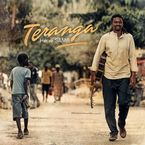Herve Samb - Teranga
Herve Samb – Teranga
Euleuk Vision / EAN 0190758026923 / Vertrieb: Bertus Distribution Bestellnummer: T71743
Veröffentlichung: 19. Januar 2018
"One of the greatest revelations of the African continent in this early 21st century" Jazz Magazine
Herve Samb stellt sein "Jazz Sabar" Konzept vor. Senegalesische Tanz-Musik verschmilzt mit Jazz und Sabar, einer typischen Form der Percussion. Es öffnet den Blick auf die aktuelle Vitalität afrikanischer Musik und es läd auf eine Reise zwischen Tradition und Moderne ein. Hier sind absolut talentierte junge Musiker an der Arbeit…. Es werde Licht!
Herve Samb Tour Spring 2018
30.01.2018 CH-Zürich, Moods
31.01.2018 A-Dornbirn, Spielboden
01.02.2018 München, Unterfahrt
03.02.2018 A-Wien, Porgy&Bess
05.02.2018 Mühldorf, Haberkasten
06.02.2018 A-Innsbruck,Treibhaus
08.02.2018 Berlin, A-Trane
10.02.2018 Tübingen, Sudhaus+Prinz K
11.02.2018 Freiburg, Jazzhaus
13.02.2018 F-Paris, Studio de l’ermitage
18.04.2018 CH-Cully, Cully Festival
A subtle composer and guitarist with the instinct of a gifted musician, Dakar-born Herve Samb had multiple collaborations (Somi, Jimmy Cliff, Meshell Ndegeocello, Oumou Sangaré, Amadou & Mariam, David Murray, Marcus Miller, Salif Keïta, Lisa Simone and many others), took part in over 100 albums, released the critically-acclaimed gems Cross Over (2009), Kharit (2012) and Time To Feel (2013) and now introduces Teranga and his "Jazz Sabar" concept, a project dear to this heart.
Following a dazzling career in Europe then in the United States, he is now back in his native Dakar where Herve Samb gathered Senegalese musicians around a gypsy guitar specially commissioned from a Parisian luthier, and recorded Teranga. A homecoming journal, it is absolutely not a withdrawal from other cultural identities. It is an open book that deserves to be opened.
As Herve Samb himself states: "This album is a door", a door through which he enters middle-age after achieving the childhood dreams that made him an iconic figure of contemporary jazz music, a door through which you travel from the Western world to Africa where he took his first steps and played his first notes, a door that lets you go back and forth between tradition and modernity, an open door like the door to a house as welcoming as the country praised by the Senegalese musician. In Wolof, Teranga means "hospitality", "invitation".
"Generally speaking, mixed projects rely on European or American jazzmen wanting to enrich their music with African, Indian, exotic cultures … It is much more unusual the other way around" and this is what Teranga superbly accomplishes. Jazz music penetrates Senegalese dance. It sings and breathes an African tune. This is how a genre that Herve Samb calls "Jazz Sabar " takes shape. Ubiquitous on the album, sabar is a traditional percussion so enshrined in local music that its sound and rhythms are like the voice and accent of Senegal itself.
In order to achieve this encounter between the jazz repertoire and traditional music, the guitarist turned to Alioune Seck, a master of sabar coming from a large family of percussionists. There, the "musician of the world" presented jazz themes to the sabar musician who, in turn, suggested and adapted traditional rhythms. From this long upstream work stemmed a record on which you can hear a third of very well-known standards take ownership of a foreign language. "I picked them because they had a positive, major, happy note. They merged well into metrics and the Senegalese approach." You can recognize "There Will Never Be Another You", "Days of Wine and Roses" or "Giant Steps", themes whose melody and chord chart are unchanged but to which the rhythm and phrasing give an undoubtedly African color. Jazz no longer speaks familiar English, it takes Wolof accents and thereby finds a way of telling its story differently. Whereas swing relies on the second and forth beats of the bar, sabar emphasizes the first and third beats: "If we took out the notes from my solos to listen only to the rhythm, we could hear a sabar solo".
With this "Jazz Sabar ", Herve Samb indeed intends to offer jazz music hospitality in Senegalese music so that it feels at home. But it is not the only ambition of Teranga . It is also a way for the guitarist to drawn the attention of young Senegalese musicians to the richness of their country's traditional music. Indeed, even though he blossomed in Europe and almost settled several times in the United States, Herve is now rediscovering with delight the traditional music of the elders he had spurned when, as a young Dakar musician, he only dreamed of Western music. "I wanted to get to know traditional music as well as I know jazz". Drawing on the large experience that has sharpened his ears, he is now passionate about a music which, during his childhood, was so familiar that he heard it everywhere without ever listening to it.
In order to share its beauty and strength with a wide audience, Teranga has, in addition to standards and original compositions, a few pieces from the traditional repertoire. There is no way however that sabar and tradition are allowed to conceal the modern vitality of Senegalese music. A product of a rich past worth being studied, the country nevertheless enthusiastically plays music in the present time. Wanting to let the whole world know about it, Herve Samb invited many singers to join him on this album. Their common point is that they sing in Wolof, but they come from all over. On Teranga, the griot meets the young representative from the urban scene or a pop singer. This goes to show that the Senegalese musicians are a mirror-crowd. To party together, the only thing missing was the federating guitar of a local kid shaped by his travels.
www.stone-art-and-sound.com





